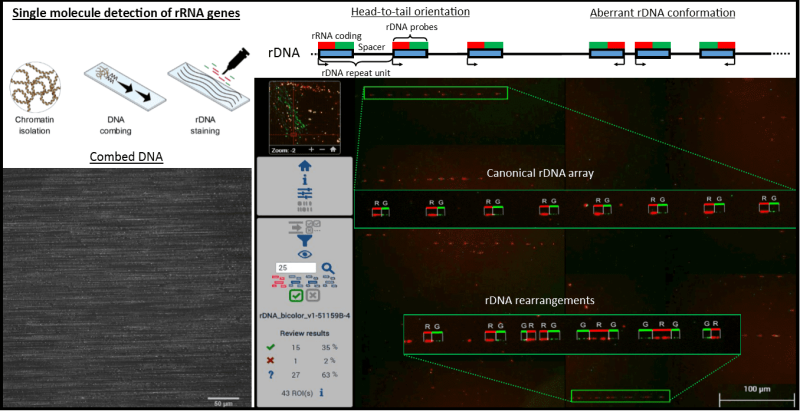Single molecule analysis of rRNA genes by stretching of genomic DNA and staining with probes (Molecular Combing).
Graphic: Holger BierhoffPrincipal Investigator: Holger Bierhoff
The research group “Epigenetics of Aging“ led by Holger Bierhoff is located at the Institute of Biochemistry and BiophysicsExternal link of the Friedrich Schiller University. A major research focus lies on the epigenetic regulation of genes encoding ribosomal RNA (rRNA). In eukaryotes, the cell nucleus harbors hundreds of rRNA gene copies (rDNA) clustered in nucleoli. Whereas part of rDNA is highly transcribed, around 30-50 % of rRNA genes are permanently silenced by epigenetic mechanisms. In the bakers’ yeast Saccharomyces cerevisiae, this constitutive heterochromatin becomes perturb during replicative aging, resulting in increased DNA damage and accumulation of extrachromosomal rDNA circles. Loss of epigenetic and genomic rDNA integrity, and formation of rDNA circles are causally involved in aging of yeast cells.
While in higher model organisms and humans rDNA instability has also been linked to aging, the underlying epigenetic mechanisms as well as the occurrence of rDNA circles are still elusive. Therefore, the aim of our project is to unravel the mechanisms of rDNA aging in humans and mice. We will employ cell culture experiments to investigate how epigenetic regulation and rDNA stability are connected. Moreover, in biosamples from human subjects and mice we will use high-throughput single DNA molecule analysis (Molecular Combing) to assay aging-dependent aberrations of rDNA. The presence of rDNA circles will be measured with new deep sequencing approaches.
We hope that our project broadens the understanding of aging at the molecular level. Our insights will reveal if epigenetic and genomic changes of rRNA gene loci can serve as biomarkers for aging. Within the framework of IMPULS, we will put rDNA aging into context with other age-related cellular changes, but also with psychological aging mechanisms.
